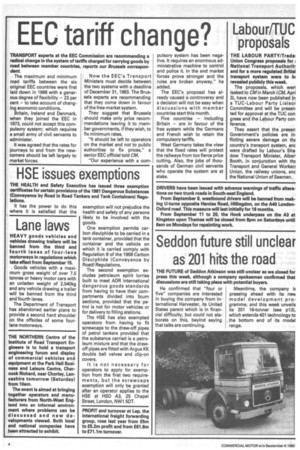EEC tariff change?
Page 4

If you've noticed an error in this article please click here to report it so we can fix it.
TRANSPORT experts at the EEC Commission are recommending a radical change in the system of tariffs charged for carrying goods by road between member countries, reports our Brussels corrsepondent.
The maximum and minimum road tariffs between the six original EEC countries were first laid down in 1968 with a generous degree of flexibility — 23 per cent — to take account of changing economic conditions.
Britain, Ireland and Denmark, when they joined the EEC in 1973, could not accept this compulsory system; which requires a small army of civil servants to administer.
It was agreed that the rates for journeys to and from the newcomers should be left largely to market forces. Now the EEC's Transport Ministers must decide between the two systems with a deadline of December 31, 1983. The Brussels experts are recommending that they come down in favour of the free-market system.
They suggest that Brussels should make only price recommendations leaving it to member governments, if they wish, to fix minimum rates.
"It should be left to operators on the market and not to public authorities to fix prices," a senior EEC official told CM.
"Our experience with a com pulsory system has been negative. It requires an enormous administrative machine to control and police it. In the end market forces prove stronger and the rules are broken anyway," he added.
The EEC's proposal has already caused a controversy and a decision will not be easy when discussions with member countries start this month.
Five countries — including Britain — are in favour of the free system while the Germans and French wish to retain the compulsory tariffs.
West Germany takes the view that the fixed rates will protect the railways from too fierce price cutting. Also, the jobs of thousands of German civil servants who operate the system are at stake.




















































